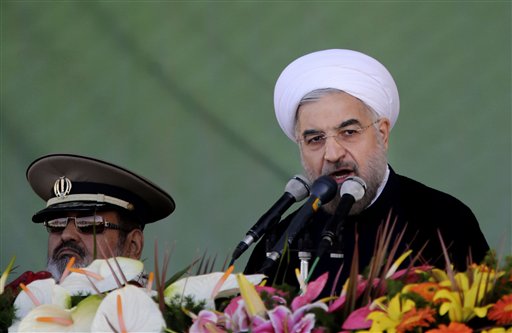Desperate to find a way out of the political and economic crises that surround it, the Iranian regime finally gave in to nuclear talks with the P5+1 in Geneva. The economic crisis in Iran has raised the potential of a popular uprising against the ruling mullahs by the Iranian people and their organised resistance to an explosive level, and has set the regime on the road to its downfall.
One example of the social dissatisfaction was the protests recently held by the Bakhtiari people in southern cities, in which the demonstrators chanted “Death to Khamenei!” and “Death to Rouhani!” and expressed their will to overthrow the ruling regime.
Hassan Rouhani, the regime’s president, is trying to contain the economic crisis in Iran by obtaining sanctions relief at the negotiating table. However, the principle cause of the crisis isn’t the sanctions but the current bankrupt, crippled, collapsed and uncontrollable economy that is the result of three decades of religious dictatorship by the mullahs in Iran.
Since Rouhani assumed office, his roadmap was to find a way out of the economic crisis in the span of a hundred days through nuclear negotiations and sanctions relief. Thus he undertook the path of “drinking the chalice of poison” in the nuclear talks in order to improve the economic situation for the sake of the regime’s survival.
In response, Javad Mansouri, former chief of the Islamic Revolutionary Guard Corps (IRGC) and one of the authorities closely tied to Supreme Leader Ali Khamenei, said to Fars News Agency, “Our country’s state won’t get better than this and our problems won’t be solved, because the roots of the problems are within the country itself. Even if gold rains down from Iran’s skies, the situation will remain the same. Don’t presume that if Mr Zarif [the regime’s foreign minister] signs a final agreement and even if the West remains loyal to its promises, all of our problems will be solved.”
The Iranian regime’s incapability in solving its economic, political and social problems – even through sanctions relief – and its lack of power to prevent the explosion of a widespread uprising are facts that are clearly known, even to the regime’s own authorities.
This two-part article will take a brief look at the economic situation in Iran, which will vividly prove that this regime is on the path to its collapse.
Iran’s Bankrupt Economy
On the eve of the Geneva negotiations, Rouhani declared that the country’s coffers are empty. Regarding the Iranian regime’s economic crisis, Javan newspaper, affiliated to the IRGC, quoted Ali Tayeb Nia, the regime’s minister of economy and treasury, writing, “Production continues at a 40 percent rate, and in some industries, 30 percent. This indicates that the workforce is growing in numbers while the capacity of economic establishments is shrinking.”
Javan newspaper draws the following conclusion: “First, the government owes more than 100 trillion Rials [approximately $4 billion] to contractors. Second, 4,000 trillion Rials’ [approximately $160 billion] worth of construction projects are suspended and are unresolved. Third, inflation has risen over 40 percent. Fourth, the production sector is faulty. Fifth, underground economic endeavours and profits through brokering activities have increased. Sixth, the government is facing a serious budget shortage.”
In addition to the summary given by Javan newspaper, the imposed sanctions have only exacerbated the situation and made it far more difficult. Therefore, it is clear that the Iranian regime is facing dark prospects in the job sector.
Recession in Iran’s Markets
Iran’s markets are suffering from an unprecedented recession. According to the regime’s authorities (Etemad newspaper, February 12), “The current recession is without precedence in the past 70 years.” The cause of this record level of inflation is the extraordinary poverty rate in the country.
One of Tehran’s powerful merchants claims that if the economic conditions of the country don’t change by the end of the year, most market producers will go out of production by the beginning of the next year, leaving an army of unemployed workers in their wake.
The recession isn’t limited to one or several domains of production, but is comprehensive. Regarding the sluggishness of the clothing market, Etemad newspaper, affiliated to Rouhani’s faction, wrote, “Even 50 percent discounts weren’t enough to reduce the market’s sluggishness.”
The meaning of this recession is that the wheels of the country’s economy are spinning at a very slow rate and will eventually come to a total stop.
During the elections, Rouhani claimed that after taking up office, he would boost the market before the end of the year (March). He didn’t go further than words on his promise.
Majeed Mohades is a member of the People’s Mojahedin Organisation of Iran (PMOI), the main opposition to the clerical regime in Tehran. He lives in Iraq.

COMMENTS
Please let us know if you're having issues with commenting.